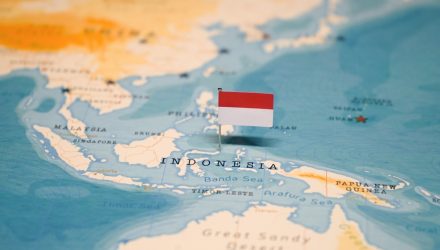For different reasons, China and India remain the primary earners of emerging markets investing headlines this year, but risk-tolerant tactical investors might want to consider to smaller markets with upside potential. One of which is Indonesia, which is accessible via exchange traded funds such as the VanEck Vectors Indonesia Index ETF (NYSEArca: IDX).
IDX turned 15 years old in January, making it the oldest US-listed ETF dedicated to Indonesian equities. While Indonesia doesn’t garner press on par with China or India, that doesn’t imply a lack of investing merit or economic heft. In 2022, Indonesia posted a GDP of $1.31 trillion, the 16th-largest in the world and the largest in Southeast Asia.
Importantly, the size of Indonesia’s financial markets is increasing, too. At the end of last year, the FTSE Indonesia Total Cap Index had a combined market capitalization of $452 billion, a 19.6% jump from the figure seen at the end of 2022. That could be a harbinger of long-term opportunity with Indonesian equities.
IDX Could Offer a Surprising Opportunity
While Indonesia isn’t the flashiest developing economy, it could be taking on more of a growth feel as its technology sector expands.
“While Financials have traditionally dominated the FTSE Indonesia Index, a notable shift has occurred with the emergence of technology companies like Goto Gojek Tokopedia (“Goto”), reflecting the evolving landscape of the Indonesian market,” noted Miko Huang of the London Stock Exchange Group.
Currently, IDX allocates 26.06% of its weight to financial services stocks – the ETF’s largest sector exposure. While the fund has no tech exposure as of yet, it does devote 12.3% of its weight to communication services and consumer discretionary names and as the Indonesian tech scene expands, the IDX portfolio may change to reflect that expansion.
Regarding economic growth, data confirm Indonesia has that and it also has favorable demographics. Those include the point that many citizens of the country can accurately be classified as middle class or above, meaning investors don’t have to wait for a middle class investment thesis to develop. That’s relevant because as it pertains to other developing economies, waiting on middle class growth has been an exercise in frustration for investors.
“Indonesia’s economy expanded by 5.05% in 2023, despite a broader global economic slowdown, rising geopolitical tension, and inflation risk. Growth came in at 5.04% in 4Q 2023, an acceleration from Q3 and higher than the same period in 2022. Household consumption continues to be the main driver for the country’s economy, comprising 53% of its total GDP for 2023. Classified as an ‘upper-middle-income’ country by the World Bank, Indonesia is on the rise,” added Huang.
For more news, information, and analysis, visit the Beyond Basic Beta Channel.







